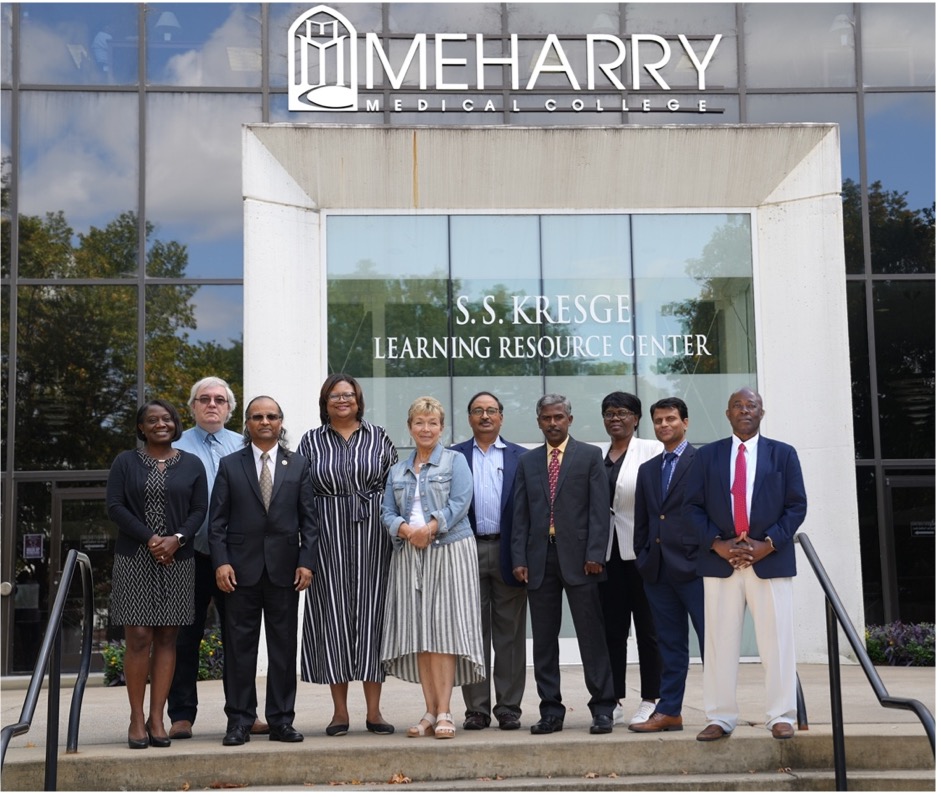Diversity Center for Genome Research at Meharry
Principal Investigator: Anil Shanker, Ph.D. (Contact PI/PD)
Meharry Medical College (MMC) is committed to bridging the gaps for underrepresented, disadvantaged minority (URM) groups by establishing a Diversity Center for Genome Research (DCGR). The Diversity Center will narrow inequitable representation gaps for URM by realizing our vision to promote African ancestry genomic research through infrastructure building and the formation of basic, clinical, and computational science research teams that are inclusive, interdisciplinary and community-engaged.
Center Goals and Objectives
- Transform the organizational infrastructure and processes supporting academic excellence in genomics research of populations with African ancestry.
- Promote research collaborations and mentorship networks to enrich the quality of genomics research and establish a social and academic network for scientific community building among basic, clinical and computational science stakeholders.
- Maximize the effectiveness of a faculty cohort to advance genomics research competencies and attainment of career milestones by fostering faculty development and making MMC a magnet that attracts other underrepresented minority genomics scholars.

Center Cores
- Administrative Core
Co-Leads: Anil Shanker, Ph.D., and LaMonica Stewart, Ph.D.
The Administrative Core (AC) will manage the administrative, fiscal and scientific aspects of the Diversity Center for Genome Research (DCGR), including accreditation of a genetics graduate program; oversight of career enhancement activities for students, trainees, and faculty; and fostering synergy with other ongoing genomic training and career development activities. The AC will define program expectations, provide solutions to barriers, and commit resources. In addition, the AC will oversee the evaluation of each proposed activity and the impact of the Center in terms of 1) enhancing DCGR's research capacity to facilitate genomic research; 2) increasing productivity of investigators; and 3) ensuring the DCGR's success in obtaining research funding.
- Community Engagement Core
Co-Leads: Stephania-Miller Hughes, Ph.D., Leah Alexander, Ph.D., and Rajbir Singh, M.B.B.S.
The Community Engagement Core (CEC) will support existing and facilitate new long-term, genomics-research-focused relationships with community-based organizations and other community stakeholders. Also, this core will develop and implement strategies to increase community education and awareness about genomics to facilitate the recruitment and retention of participants in genomics research studies. Additionally, this core will strive towards disseminating DCGR-generated genomics research efforts and findings among diverse community groups and audiences. Through these engagements, the CEC expects an increased trust in genomics research, increased perceived research advantages and decreased perceived research disadvantages.
- Workforce Development Core
Co-Leads: Aramandla Ramesh, Ph.D., Sanika Chirwa, M.D., Ph.D., and Qingguo Wang, Ph.D.
The goal of the Genomic Workforce Development Core (GWDC) is to promote multidisciplinary team science in genomics, train students and foster the career development of junior investigators. This core will develop innovative strategies to recruit K-12 students, undergraduate, master’s, and pre-doctoral students, post-doctoral fellows and other investigators to enhance their expertise in African ancestry genetics and genomics. Additionally, this core will leverage resources available from the Community Engagement Coreand the Ad ministrative Core to provide professional and career development opportunities for Early-Stage Investigators (ESIs), thus laying the foundation for a career pathway of minority researchers entering genetics and genomics.
Research Projects
Research at the Diversity Center for Genome Research at Meharry Medical College centers on the genetic basis of chronic diseases prevalent among African Americans, complementing the college’s other ongoing genomics initiatives.
Genotype-disease associations for African ancestry-specific, homozygous loss-of-function variants
Lead: Dorin Borza, Ph.D.
- The objectives of this project are to validate genotype-disease associations in independent cohorts and investigate the underlying mechanisms.
- Both sarcoidosis and tuberculosis are diseases that exhibit racial disparities, disproportionately affecting African Americans.
- The study proposes to test the hypothesis that complete deficiency of the PLA2R1 gene is a genetic risk factor for sarcoidosis and tuberculosis and that the expression of PLA2R protein protects against these diseases.
Immunophenotyping and mitochondrial analysis of blood cells from African-American patients with chronic inflammatory diseases
Co-Leads: Alla Ivanova, Ph.D., and Anil Shanker, Ph.D.
- The objectives of this project are to unravel the protective roles of immune responses and mitochondrial activities in populations with higher risks of inflammatory conditions, such as cancer, dementia and infectious diseases.
- This study tests the hypothesis that molecular profiles of the immune cell in correlation with mitochondrial activity will reflect an individual’s overall health.
- Therefore, the study plans to characterize prominent mitochondrial and immunological changes in ancestrally diverse patients with dementia, cancer and tuberculosis.
- From these data, the study aims to develop a health index to serve as a powerful diagnostic tool for the most vulnerable patients from underrepresented populations.
Establishment of a biorepository for the study of loss-of-function variants in diseases with known health disparities
Lead: Rajbir Singh, M.B.B.S.
- The aim of this study is to build the biorepository and evaluate loss-of-function variants in patients belonging to minority populations.
- Inclusion of diverse populations in biomedical research is essential to ensure that emerging standards of care for prevention, diagnosis and treatment are equally effective for all populations.
- This study will focus on patients with diseases with known health disparities, such as cancer, hypertension, kidney disease, diabetes, obesity, neurodegenerative diseases and psychiatric disorders.
- This study will address barriers to recruitment of participants from underrepresented groups in genomics research by soliciting participant feedback.
Last updated: November 30, 2023
